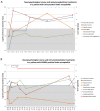Neuropsychological Evaluations in Limbic Encephalitis
- PMID: 33947002
- PMCID: PMC8145692
- DOI: 10.3390/brainsci11050576
Neuropsychological Evaluations in Limbic Encephalitis
Abstract
Limbic encephalitis (LE) can cause dynamic and permanent impairment of cognition and behavior. In clinical practice, the question arises as to which cognitive and behavioral domains are affected by LE and which assessment is suited to monitor the disease progress and the success of treatment. Current findings on cognition and behavior in LE are reviewed and discussed based on current guidelines and consensus papers. In addition, we outline approaches for the neuropsychological monitoring of LE and its treatment. Dependent on disease acuity and severity, LE leads to episodic long-term memory dysfunction in different variants (e.g., anterograde memory impairment, accelerated long-term forgetting, and affection of autobiographical memory) and executive deficits. In addition, affective disorders are very common. More severe psychiatric symptoms may occur as well. In the course of the disease, dynamic phases with functional recovery must be differentiated from residual defect states. Evidence-based neuropsychological diagnostics should be conducted ideally before treatment initiation and reassessments are indicated when any progress is suggested, and when decisive anti-seizure or immunomodulatory treatment changes are made. Cognition and behavior may but must not run in synchrony with seizures, MRI pathology, or immune parameters. Cognitive and behavioral problems are integral aspects of LE and represent important biomarkers of disease acuity, progress, and therapy response beyond and in addition to parameters of immunology, neurological symptoms, and brain imaging. Thus, evidence-based neuropsychological assessments are essential for the diagnostic workup of patients with suspected or diagnosed limbic encephalitis, for treatment decisions, and disease and treatment monitoring.
Keywords: assessment; auto-antibodies; autoimmune epilepsy; behavior; cognition; diagnostics; limbic encephalitis; memory; monitoring; neuropsychology.
Conflict of interest statement
J.-A.W. reports personal fees from Eisai, outside the submitted work; C.H. reports personal fees from UCB, Eisai, Desitin, GW, Precisis and funding by ERN EpiCare.
Figures

References
-
- Helmstaedter C., Hansen N., Leelaarporn P., Schwing K., Oender D., Widman G., Racz A., Surges R., Becker A., Witt J.-A. Specific B- and T-cell populations are associated with cognition in patients with epilepsy and antibody positive and negative suspected limbic encephalitis. J. Neurol. 2021;268:455–466. doi: 10.1007/s00415-020-10158-1. - DOI - PMC - PubMed
Publication types
LinkOut - more resources
Full Text Sources
Other Literature Sources

